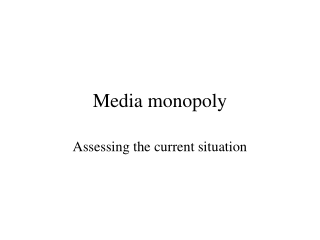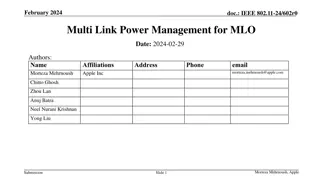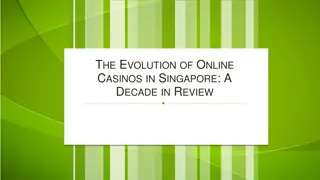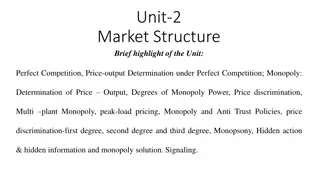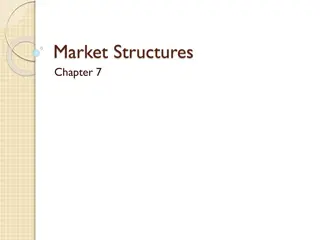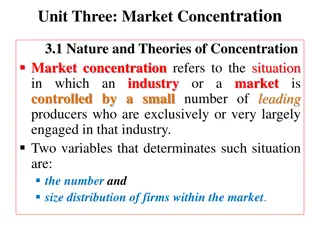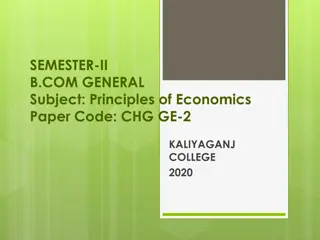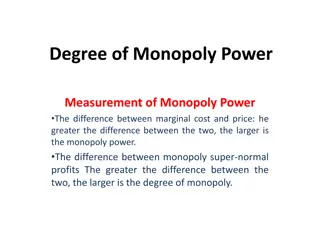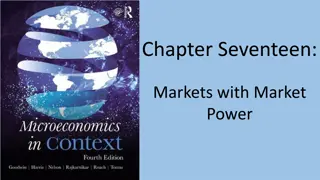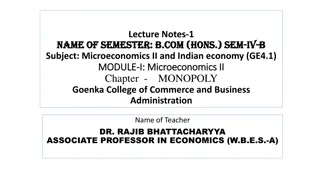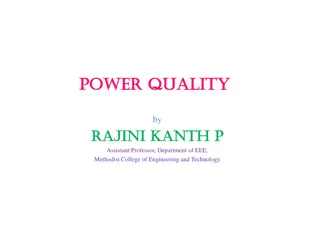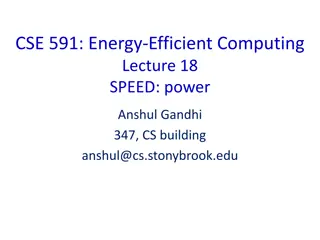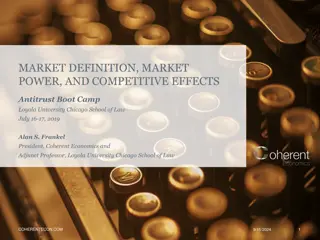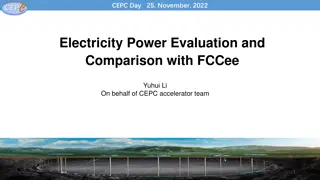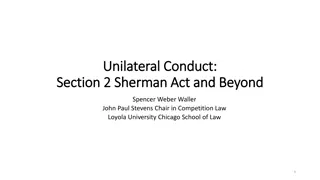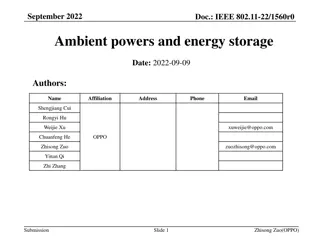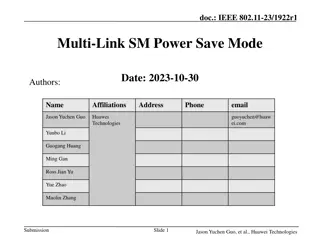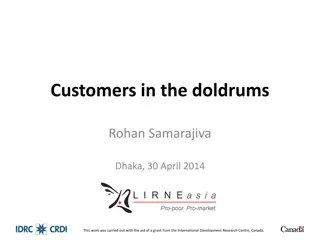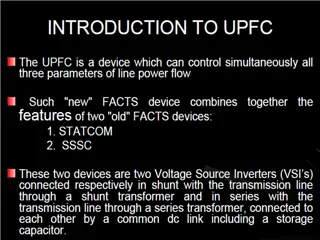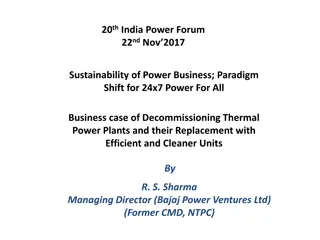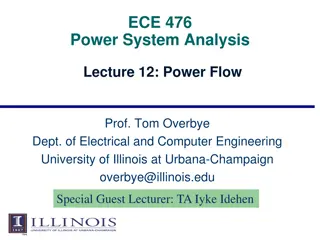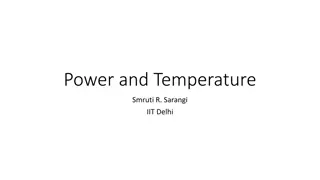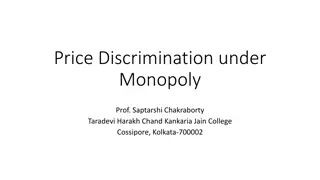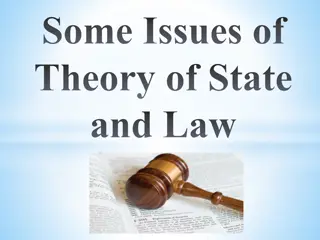Media monopoly
Explore the implications of corporate media control on politics, culture, and democracy. Analyze the challenges faced in contemporary debates about media control. Assess the role of new communication technologies in reshaping media power dynamics. Understand the transformation of the U.S. media syst
2 views • 47 slides
Cisco Systems Fault Managed Power Portfolio Overview
Cisco Systems offers an industry-leading Fault Managed Power (FMP) patent portfolio comprising 24 active assets across seven INPADOC families. The portfolio includes patents supporting fault-managed power systems, PoE deployments, DC power distribution, DC-DC conversion, and HVDC connectors. The FMP
4 views • 4 slides
Alternatives to Regulation in the Market: Public Enterprise and Franchise Bidding
Understanding the concept of natural monopoly problem and exploring the alternatives to market regulation such as public enterprise and franchise bidding, with a focus on cable television. Delve into the challenges and benefits of each approach, including the potential of franchise bidding to achiev
6 views • 22 slides
Improving Multi-Link Power Management Efficiency in IEEE 802.11 Networks
The document discusses challenges with per-link power mode changes in multi-link scenarios in IEEE 802.11 networks, proposing a solution for more efficient power management. It addresses issues such as latency and inefficiencies in signaling for power mode changes, introducing scheduled multi-link p
6 views • 9 slides
The Evolution of Online Casinos in Singapore A Decade in Review
The initial years saw a clear distinction between online and offline gambling. The Singapore Pools monopoly dominated the market, offering legal avenues for Singapore sport bet and Singapore horse racing live odds. Online casinos, however, operated in a grey area.\nFor more information about online
6 views • 4 slides
Understanding Power Transfer and Impedance Matching in Circuits
Exploring the concept of maximizing power transfer between a source and load through impedance matching. Learn about complex conjugates, real and magnitude of complex numbers, average power in circuits, and the importance of minimizing reflected power. Discover how incident, reflected, and delivered
3 views • 33 slides
Market Structures and Competition Overview
Market structures in economics define the competitive characteristics of different markets. Perfect competition features many small firms producing identical products as price takers. Monopoly has one seller with significant market power, while monopolistic competition involves firms with some marke
4 views • 5 slides
Market Structures: Perfect Competition vs Monopoly
Perfect competition features identical products, many sellers, and low barriers to entry, promoting efficiency. Monopolies, with one seller, can abuse power but are allowed in select industries. Understanding market structures is crucial for economic analysis and policy-making.
0 views • 23 slides
Overview of Farm Power Sources and Utilization in Agriculture
Farm power sources in agriculture include human, animal, mechanical, and renewable energy. Human power is costly but versatile, while animal power is traditional and provides manure. Mechanical power from tractors and engines is efficient. India's farm power sources reflect a mix of traditional and
0 views • 12 slides
Understanding Market Concentration and Its Implications
Market concentration refers to industries controlled by a small number of leading producers, impacting pricing and output decisions. Various theories, measurement methods, and implications on firm behavior and performance are discussed, highlighting the relationship between monopoly power and market
0 views • 62 slides
Law, Strategy, and Human Rights in Global Sports Industry
The content delves into the legal aspects and strategic considerations within the globalized sports industry with a focus on monopolization, abuse of dominant position, and human rights constraints on sporting entities. It discusses the implications of attaining monopoly power, abuse by National Gov
0 views • 15 slides
Understanding Profit: The Entrepreneur's Reward
Profit is the reward for entrepreneurial functions and differs from returns on other factors due to its uncertain and residual nature. Various theories such as Frictional, Monopoly, Compensatory, and Innovation shed light on the complexities of profit generation in business.
0 views • 15 slides
Understanding Revenue Concepts in Different Market Conditions
Explore revenue concepts like Total Revenue (TR), Marginal Revenue (MR), and Average Revenue (AR) along with elasticity of demand in various market structures such as perfect competition, monopoly, monopolistic competition, and oligopoly. Learn about short and long-run equilibrium conditions and the
0 views • 21 slides
Understanding Monopoly Power and Regulation in Economics
Degree of Monopoly Power is measured by the difference between marginal cost and price, with a greater difference signifying larger monopoly power. Prof. Abba P. Lerner's formula for monopoly power emphasizes the gap between price and marginal cost. Monopoly power can also be assessed using price el
0 views • 4 slides
Top WHO-GMP-ISO Certified Monopoly Pharma Franchise Company
Top WHO-GMP-ISO Certified Monopoly Pharma Franchise Company in India. Contact Unibiotech Formulations At 917814301804, 919216901651
1 views • 5 slides
Understanding Monopolistic Competition in Market Structures
Monopolistic competition lies between perfect competition and monopoly, where many sellers offer similar but non-identical products. This type of market allows for new firms to enter freely in the long run, enabling product differentiation and individual pricing strategies. Learn about the main feat
0 views • 37 slides
Understanding Oligopoly in Microeconomics
Introduction to oligopoly, a market structure between perfect competition and pure monopoly. In oligopoly, only a few sellers offer similar or identical products, leading to a balance between cooperation and self-interest. Characteristics of an oligopoly market include interdependence among firms an
0 views • 46 slides
Understanding Markets with Market Power
Explore the dynamics of markets characterized by market power through a detailed analysis of topics such as monopoly profit maximization, welfare analysis, price discrimination, and competitive firm entry effects. Delve into concepts like payoff matrices, the prisoner's dilemma, and industry concent
0 views • 14 slides
Understanding Monopoly in Microeconomics
A comprehensive discussion on the concept of monopoly, its sources of power, short-run and long-run equilibrium of a monopoly firm, price discrimination, and the social cost of monopoly. It also covers practical aspects like measuring monopoly power and the social implications of monopoly behavior s
0 views • 8 slides
Understanding Power Quality and Its Impact on Electrical Systems
Power quality refers to the characteristics of electrical power that drives sensitive equipment. It involves voltage and current deviations from ideal waveforms, impacting the efficiency and reliability of electrical systems. Various types of power quality phenomena exist, such as voltage variations
1 views • 16 slides
Helicopter Power Management Guidelines
Understanding the factors that can lead to power required exceeding power available in a helicopter is crucial for safe operation. Indications such as uncommanded descent, rotor droop, loss of tail rotor authority, and right yaw signal potential issues to watch out for. Knowing when such occurrences
0 views • 11 slides
Exploring Power Efficiency in Computing Systems
In this lecture series on energy-efficient computing, various concepts related to dynamic frequency scaling, power capping, power shifting, power modeling, and power measurement are discussed. The impact of power on server speed is explored, alongside strategies for improving performance within powe
0 views • 17 slides
Understanding Antitrust Laws: Market Definition and Power Analysis
The economic purpose of antitrust laws is to ensure overall economic efficiency by focusing on whether a practice benefits or harms consumers. Antitrust cases involve defining relevant markets and assessing market power, distinguishing between market power and monopoly power. Understanding these con
0 views • 20 slides
Comparison of Electricity Power Systems Between CEPC and FCCee
The evaluation and comparison of electricity power systems between the CEPC and FCCee accelerators reveal the power breakdowns, RF power consumption, magnet power supply, and overall power usage. Differences in power consumption for various components such as RF, magnets, and vacuum systems are high
0 views • 19 slides
Understanding Section 2 of the Sherman Act
Section 2 of the Sherman Act addresses unilateral conduct related to monopolization and anti-competitive behavior. It focuses on the possession or acquisition of monopoly power, predatory conduct, and the intent to monopolize. The key principle under US law governing single firm conduct is the proof
0 views • 16 slides
Ambient Power Harvesting Technologies Overview
This document discusses various ambient power harvesting technologies such as RF energy, solar power, light, and thermal energy. RF-based energy harvesting utilizes radio waves for power transmission with potential applications in logistics, smart homes, and environmental monitoring. Solar power off
0 views • 12 slides
Action for Economic Reforms in Rice Sector and Bus Transport
Madeiline Joy Aloria implemented actions for economic reforms in the rice sector and bus transport in November 2014. The main issues identified were the trade monopoly of the National Food Authority in the rice sector and traffic congestion in bus transport due to cut-throat competition. Activities
0 views • 9 slides
Power Quality Monitoring and Evaluation in Modern Energy Systems
Power quality is crucial for stable operations in energy systems. This content discusses issues in power supply, reasons for measuring power quality, consequences of bad power quality, methods for measuring power quality, and evaluation techniques for compliance reports. Tracking power quality param
0 views • 21 slides
Power Dynamics in the Hellenistic World: A Study of Olympias of Macedon
Exploration of power dynamics in the Hellenistic world through the multidimensional exercise of power by Olympias of Macedon. The study delves into various forms of power such as reward, coercive, legitimate, referent, and expert power, shedding light on their roles in shaping leadership and influen
0 views • 20 slides
Enhancing Power Efficiency in IEEE 802.11 Multi-Link SM Power Save Mode
The document discusses how Multi-Link Operation (MLO) in IEEE 802.11be can improve throughput and reduce latency but may increase power consumption for non-AP devices. It introduces the concept of Multi-Link SM Power Save mode to optimize power usage by activating multiple links only when necessary,
0 views • 10 slides
Challenges and Solutions in Consumer Protection within Monopoly Environments
Consumer protection in the context of monopoly environments presents unique challenges and requires specific actions. Professor Stephen Littlechild highlights the importance of competition as the most effective means of protecting consumers. In situations where there is a single supplier, such as in
0 views • 9 slides
Understanding Power Consumption in Memory-Intensive Databases
This collection of research delves into the power challenges faced by memory-intensive databases (MMDBs) and explores strategies for reducing DRAM power draw. Topics covered include the impact of hardware features on power consumption, experimental setups for analyzing power breakdown, and the effec
0 views • 13 slides
Understanding Market Structure and Power in Economics
Market structure defines the environment in which firms operate, based on factors like the number and type of buyers and sellers, products offered, barriers to entry, and information symmetry. Market power, on the other hand, refers to a firm's ability to control output and pricing. The relationship
0 views • 9 slides
Overview of Unified Power Flow Controller (UPFC) in Power Systems
A Unified Power Flow Controller (UPFC) is a combination of a Static Synchronous Compensator (STATCOM) and a Static Synchronous Series Compensator (SSSC) interconnected via a common DC link. UPFC allows bidirectional flow of real power and provides concurrent real and reactive series line compensatio
0 views • 20 slides
Understanding Leadership and Power Dynamics
Power and leadership are interconnected concepts, with power being the measure of a person's ability to influence others. Leaders have power in various situations, but it does not necessarily mean having power over people. Effective leaders balance their use of power with knowledge and trust, knowin
0 views • 9 slides
Discussion on Sustainable Energy Solutions and Efficiency Improvements in Thermal Power Plants
The 20th India Power Forum held on 22nd November 2017 highlighted the importance of sustainability in the power business, focusing on the paradigm shift towards 24x7 power for all. Topics included decommissioning thermal power plants for more efficient and cleaner units, with insights from industry
0 views • 16 slides
Power System Analysis: Lecture on Power Flow
Lecture 12 on Power Flow Analysis in Power Systems covers the use of power balance equations when analyzing complex power consumption and generation. It explains the derivation of real power balance equations for iterative solutions in power flow analysis. The lecture highlights the need for iterati
0 views • 30 slides
Understanding Power Consumption and Temperature in Electronic Circuits
Explore the significance of power consumption in electronic circuits, focusing on reasons for high power, high temperature, and low reliability. Learn about sources of power consumption, types of power dissipation, dynamic power analysis, and the relationship between energy and power in circuits.
0 views • 30 slides
Understanding Price Discrimination in Monopoly Markets
Price discrimination under monopoly occurs when businesses charge different prices to different consumer groups for the same product or service. Conditions for price discrimination include monopoly power, market segmentation, ability to separate consumer groups, and prevention of resale. Examples of
0 views • 12 slides
Understanding the State and Law: Key Concepts and Perspectives
The discussion delves into the essence of the state and law, exploring various theoretical approaches such as social, Marxist, and political-legal perspectives. It defines the state as the main institution of the political system integrating social classes, powers, and politics, with persistent feat
1 views • 30 slides
